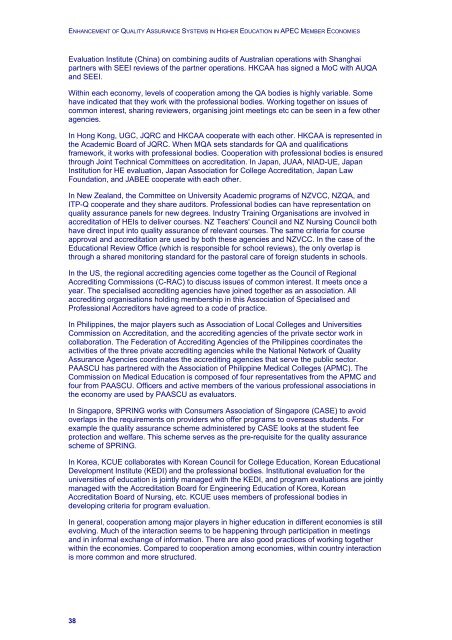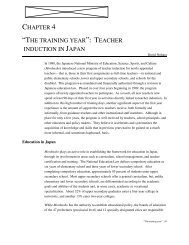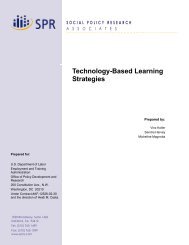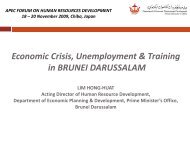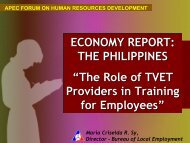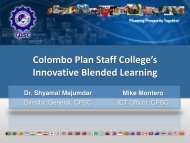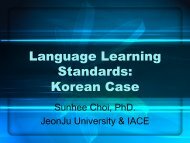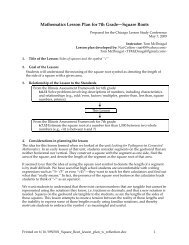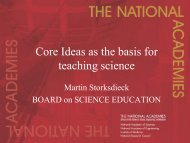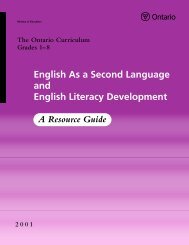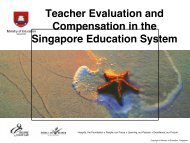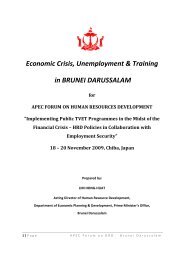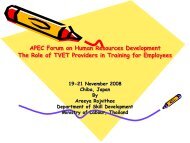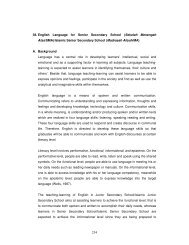Quality Assurance Systems in Asia-Pacific Economic Cooperation
Quality Assurance Systems in Asia-Pacific Economic Cooperation
Quality Assurance Systems in Asia-Pacific Economic Cooperation
Create successful ePaper yourself
Turn your PDF publications into a flip-book with our unique Google optimized e-Paper software.
ENHANCEMENT OF QUALITY ASSURANCE SYSTEMS IN HIGHER EDUCATION IN APEC MEMBER ECONOMIES<br />
Evaluation Institute (Ch<strong>in</strong>a) on comb<strong>in</strong><strong>in</strong>g audits of Australian operations with Shanghai<br />
partners with SEEI reviews of the partner operations. HKCAA has signed a MoC with AUQA<br />
and SEEI.<br />
With<strong>in</strong> each economy, levels of cooperation among the QA bodies is highly variable. Some<br />
have <strong>in</strong>dicated that they work with the professional bodies. Work<strong>in</strong>g together on issues of<br />
common <strong>in</strong>terest, shar<strong>in</strong>g reviewers, organis<strong>in</strong>g jo<strong>in</strong>t meet<strong>in</strong>gs etc can be seen <strong>in</strong> a few other<br />
agencies.<br />
In Hong Kong, UGC, JQRC and HKCAA cooperate with each other. HKCAA is represented <strong>in</strong><br />
the Academic Board of JQRC. When MQA sets standards for QA and qualifications<br />
framework, it works with professional bodies. <strong>Cooperation</strong> with professional bodies is ensured<br />
through Jo<strong>in</strong>t Technical Committees on accreditation. In Japan, JUAA, NIAD-UE, Japan<br />
Institution for HE evaluation, Japan Association for College Accreditation, Japan Law<br />
Foundation, and JABEE cooperate with each other.<br />
In New Zealand, the Committee on University Academic programs of NZVCC, NZQA, and<br />
ITP-Q cooperate and they share auditors. Professional bodies can have representation on<br />
quality assurance panels for new degrees. Industry Tra<strong>in</strong><strong>in</strong>g Organisations are <strong>in</strong>volved <strong>in</strong><br />
accreditation of HEIs to deliver courses. NZ Teachers' Council and NZ Nurs<strong>in</strong>g Council both<br />
have direct <strong>in</strong>put <strong>in</strong>to quality assurance of relevant courses. The same criteria for course<br />
approval and accreditation are used by both these agencies and NZVCC. In the case of the<br />
Educational Review Office (which is responsible for school reviews), the only overlap is<br />
through a shared monitor<strong>in</strong>g standard for the pastoral care of foreign students <strong>in</strong> schools.<br />
In the US, the regional accredit<strong>in</strong>g agencies come together as the Council of Regional<br />
Accredit<strong>in</strong>g Commissions (C-RAC) to discuss issues of common <strong>in</strong>terest. It meets once a<br />
year. The specialised accredit<strong>in</strong>g agencies have jo<strong>in</strong>ed together as an association. All<br />
accredit<strong>in</strong>g organisations hold<strong>in</strong>g membership <strong>in</strong> this Association of Specialised and<br />
Professional Accreditors have agreed to a code of practice.<br />
In Philipp<strong>in</strong>es, the major players such as Association of Local Colleges and Universities<br />
Commission on Accreditation, and the accredit<strong>in</strong>g agencies of the private sector work <strong>in</strong><br />
collaboration. The Federation of Accredit<strong>in</strong>g Agencies of the Philipp<strong>in</strong>es coord<strong>in</strong>ates the<br />
activities of the three private accredit<strong>in</strong>g agencies while the National Network of <strong>Quality</strong><br />
<strong>Assurance</strong> Agencies coord<strong>in</strong>ates the accredit<strong>in</strong>g agencies that serve the public sector.<br />
PAASCU has partnered with the Association of Philipp<strong>in</strong>e Medical Colleges (APMC). The<br />
Commission on Medical Education is composed of four representatives from the APMC and<br />
four from PAASCU. Officers and active members of the various professional associations <strong>in</strong><br />
the economy are used by PAASCU as evaluators.<br />
In S<strong>in</strong>gapore, SPRING works with Consumers Association of S<strong>in</strong>gapore (CASE) to avoid<br />
overlaps <strong>in</strong> the requirements on providers who offer programs to overseas students. For<br />
example the quality assurance scheme adm<strong>in</strong>istered by CASE looks at the student fee<br />
protection and welfare. This scheme serves as the pre-requisite for the quality assurance<br />
scheme of SPRING.<br />
In Korea, KCUE collaborates with Korean Council for College Education, Korean Educational<br />
Development Institute (KEDI) and the professional bodies. Institutional evaluation for the<br />
universities of education is jo<strong>in</strong>tly managed with the KEDI, and program evaluations are jo<strong>in</strong>tly<br />
managed with the Accreditation Board for Eng<strong>in</strong>eer<strong>in</strong>g Education of Korea, Korean<br />
Accreditation Board of Nurs<strong>in</strong>g, etc. KCUE uses members of professional bodies <strong>in</strong><br />
develop<strong>in</strong>g criteria for program evaluation.<br />
In general, cooperation among major players <strong>in</strong> higher education <strong>in</strong> different economies is still<br />
evolv<strong>in</strong>g. Much of the <strong>in</strong>teraction seems to be happen<strong>in</strong>g through participation <strong>in</strong> meet<strong>in</strong>gs<br />
and <strong>in</strong> <strong>in</strong>formal exchange of <strong>in</strong>formation. There are also good practices of work<strong>in</strong>g together<br />
with<strong>in</strong> the economies. Compared to cooperation among economies, with<strong>in</strong> country <strong>in</strong>teraction<br />
is more common and more structured.<br />
38


